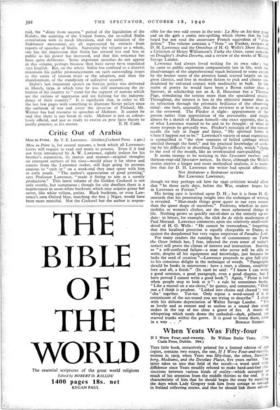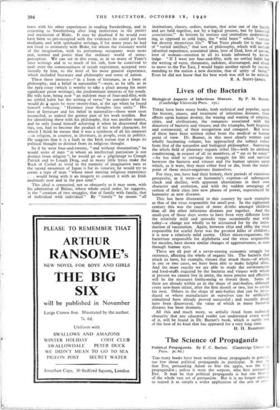When Yeats Was Fifty-four
This little book, attractively printed for a limited edition of 450 copies, contains two essays, the one, If I Were Four-and-twenty, written in 1919, when Yeats was fifty-four, the other, Sweden- borg, Mediums, and the Desolate Places, five years earlier. The latter takes 'us into that field of the occult—a word used with diffidence since Yeats steadily refused to make hard-and-fast dis- tinctions between various kinds of reality—which occupied so much of his attention from the middle thirties to the end. It is characteristic of him that he should begin the essay by recalling the days when Lady Gregory took him from cottage to cottage in Ireland collecting stories, and that he should link those adven- tures with his other experiences in reading Swedenborg, and in returning to Swedenborg after long immersion in the poetry and mysticism of Blake. It may be doubted if he would ever have been so pre-occupied with the evidences he could get from mediums and with spiritualist writings, if for many years he had not lived so intimately with Blake, for whom the visionary world of the imagination, with its portentous occupants. were more real, normal and poetic than the ordinary world of sense- perception. We can see in this essay, as in so many of Yeats's later writings and in so much of his talk, how he contrived to exalt even the commonplaces of occult experience, accepted very literally by him, to the level of his more general experience, which included literature and philosophy and sense of nation.
These three interests—" in a form of literature, in a form of philosophy, and a belief in nationality "—were, as he tells us in the 1919 essay (which is worthy to take a place among his more significant prose writings), the predominant interests of his youth. He tells how, being now " an indolent man of four-and-fifty, with no settled habit but the writing of verse," he considers what he would do if again he were twenty-four, at the age when he found himself reflecting : " Hammer your thoughts into unity." His love of literature and his belief in nationality—those were soon reconciled, as indeed the greater part of his work testifies. But for identifying these with his philosophy, that was another matter, and he only found himself achieving it when he discovered that this, too, had to become the product of his whole character; by which I think he means that it was a synthesis of all his interests —in religion, in country, in literature, in people, even in politics. He suggests that it is a fault in the Irish nation that it keeps its political thought so distinct from its religious thought.
So if he were four-and-twenty, " and without rheumatism," he would write of men " in whom an intellectual patriotism is not distinct from religion "; he would go on a pilgrimage to Croagh Patrick and to Lough Derg, and in many little lyrics make the Rock of Cashel as vivid in the memory of imaginative men as the sacred mountain of Japan is for its votaries; he would try to create a type of man " whose most moving religious experience . . . would bring with it an imagery to connect it with an Irish multitude now and in the past time."
This ideal is connected, not so obscurely as it may seem, with his admiration of Balzac, whose whole social order, he suggests, is the " creation of two struggles, that of family with family, that of individual with individual." By " family " he means " all institutions, classes, orders, nations, that arise out of the family and are held together, not by a logical process, but by historical associations." At bottom lie instinct and immediate understand- ing, as opposed to cold logic, the " wild beast " which " cannot but destroy mysterious life." What Yeats pleads for is that sort of " varied intellect," that sort of philosophy, which will include inherited experience, associated ideas, love of God, love of nation, love of woman—emotion in all its kinds informed by know- ledge. " If I were not four-and-fifty, with no settled habit but the writing of verse, rheumatic, indolent, discouraged, and about to move to the Far East, I would begin another epoch by recom- mending to the nation a new doctrine, that of unity of being." Even he did not know that his best work was still to be written,
R. A. SCOTF-JAMES.































 Previous page
Previous page